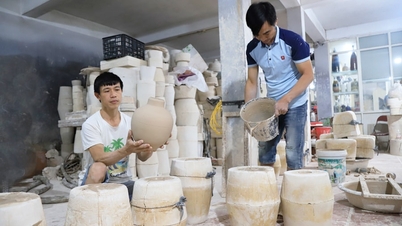Data from the Ministry of Gender Equality and Family of South Korea shows that the proportion of single-person households will reach 33.4% in 2023, double that of a decade ago.
Specifically, as of December 2023, South Korea has 9.93 million one-person households, an increase of more than 211,000 households compared to 2022.
This means that nearly half of South Koreans live alone. At the same time, the data shows that household types have become more diverse, with many South Koreans choosing to stay single, adopt children or live together without being married.
By gender, the proportion of women living alone significantly surpassed that of men at 62.3%. In terms of age, more than 50% were households of people over 60 years old, people over 70 years old accounted for 27.1% and 23.9% were under 30 years old.

A man chooses instant noodles at a supermarket in Seoul, December 2023. Photo: Yonhap
It seems that economics is one of the main reasons why people live alone. The survey found that single-person households admitted to facing difficulties in finding quality meals (42.6%). The next biggest worries were illness and emergencies (37.6%), and loneliness (23.3%).
25.6% of people living alone said they had difficulty cleaning their home, preparing meals and buying groceries. At the same time, 24.6% of single-person households said they felt anxious and 10% feared facing crime.
The growing rate of single-person households also speaks to the outlook and values of life in Korea.
More than 47% of survey participants agreed to live single and unmarried, an increase of 13 percentage points compared to 2020. To the question "Can men and women live together without getting married? " 39% agreed.
Additionally, about 20% said they could adopt while living alone and unmarried.
The survey also found that young Koreans are taking a more positive view of having children. The proportion of those in their 30s and under 30s who said they plan to have children rose 9.4 and 6.8 percentage points, respectively, to 27.6% and 15.7%, respectively, from 2020.
Although the proportion of men involved in childcare has increased compared to 2020, women still have to take on more responsibility for childcare. Specifically, they have to take care of meals, sleep, when they are sick and participate in school events. The survey found that husbands are often responsible for teaching children habits.
Ngoc Ngan (According to Korea Herald )
Source


![[Photo] Panorama of the cable-stayed bridge, the final bottleneck of the Ben Luc-Long Thanh expressway](https://vphoto.vietnam.vn/thumb/1200x675/vietnam/resource/IMAGE/2025/9/30/391fdf21025541d6b2f092e49a17243f)

![[Photo] Solemn opening of the 12th Military Party Congress for the 2025-2030 term](https://vphoto.vietnam.vn/thumb/1200x675/vietnam/resource/IMAGE/2025/9/30/2cd383b3130d41a1a4b5ace0d5eb989d)
![[Photo] The 1st Congress of Phu Tho Provincial Party Committee, term 2025-2030](https://vphoto.vietnam.vn/thumb/1200x675/vietnam/resource/IMAGE/2025/9/30/1507da06216649bba8a1ce6251816820)
![[Photo] General Secretary To Lam, Secretary of the Central Military Commission attends the 12th Party Congress of the Army](https://vphoto.vietnam.vn/thumb/1200x675/vietnam/resource/IMAGE/2025/9/30/9b63aaa37ddb472ead84e3870a8ae825)
![[Photo] President Luong Cuong receives President of the Cuban National Assembly Esteban Lazo Hernandez](https://vphoto.vietnam.vn/thumb/1200x675/vietnam/resource/IMAGE/2025/9/30/4d38932911c24f6ea1936252bd5427fa)






![[Podcast] National Day Gift Giving on September 2nd by Household](https://vphoto.vietnam.vn/thumb/402x226/vietnam/resource/IMAGE/2025/8/30/2ced906def164dd98177e0192359030f)




























































































Comment (0)